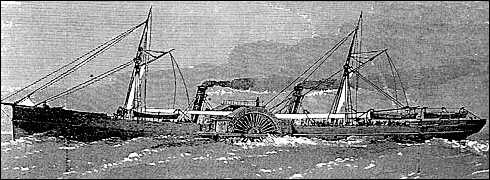
The Virginius Incident

Sidebars
- Captain Joseph Fry
- Report from Captain Castillo
- Report of Midshipman Don Angel Ortiz Monasterio
- Report from Commander Burriel on the Executions
- Report to U.S. Congress
The Ship

The ship "Virgin" was originally constructed for the Confederate navy in 1864 for use as a blockade runner during the American Civil War. It was captured by Union forces on April 12, 1865, and had spent years going back and forth between private and military ownership.
When the Cubans first set eyes on it, the Virgin had been sitting at the Washington Navy Yard. A "sidewheel steamer," describes Richard Bradford, "over 200 feet long, ten feet from waterline to deck, with a displacement of four hundred ninety-one tons, and remarkable speed." (Bradford, 25) The ship was ideal for running supplies to the rebels, and well worth the nearly $10,000 price.
Since its first rebel mission in October 1870, and over the following two years, the renamed Virginius was used by the rebels to land men and supplies at various stops on the island, prompting the Spanish empire to consider the ship an "outlaw." In 1872, Bradford writes, "the Cubans engaged in complicated maneuvers which only served to prove to anyone who had doubts that the Virginius was owned and operated by the Insurgents."
Soon a game of cat and mouse emerged between the Rebel ship and the Spanish Empire, eventually drawing in American authorities originally convinced the ship was under American ownership and entitled to U.S. legal protection.
After being hired by Cespedes to become the ship's new Captain, Joseph Fry arrived in Kingston on October 4, 1873, on the mail steamer Atlas, to assume command of the Virginius. He soon became the most important man on the ship. (Bradford)
"The ten days of their stay in port were, from all accounts, an uninterrupted succession of dinners and balls given to the members of the expedition by prominent Jamaican residents, sympathizers in the cause of Cuba Libre; Mr. De Cordova, the Peruvian consul, Dr. Manuel Govin, president of the Jamaica committee of the 'Friends of Cuba,' and many others; the last ball being given on board the Virginius on the eve of her departure." (Bradford)